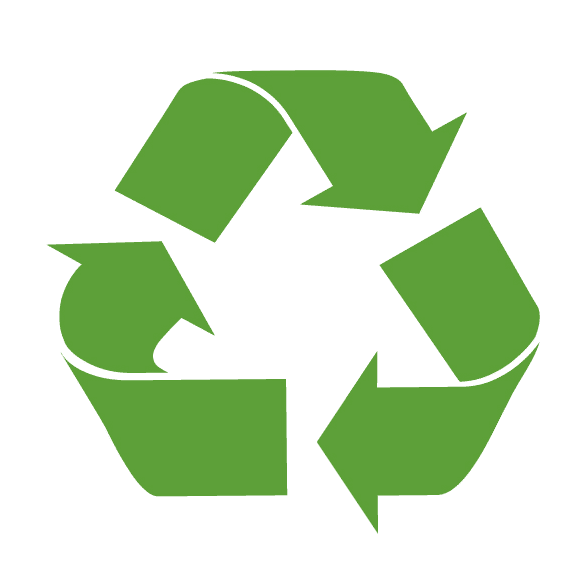 Robeson County Solid Waste has been and will continue to make all efforts to enable and encourage the businesses and citizens of Robeson County to recycle, conserve and create a sustainable environment that will enhance the livelihood of all residents. From education, outreach, recycling, clean-ups and waste to energy, Robeson County Solid Waste is constantly evolving in our efforts to accommodate changing technology, markets and needs of the community.
Robeson County Solid Waste has been and will continue to make all efforts to enable and encourage the businesses and citizens of Robeson County to recycle, conserve and create a sustainable environment that will enhance the livelihood of all residents. From education, outreach, recycling, clean-ups and waste to energy, Robeson County Solid Waste is constantly evolving in our efforts to accommodate changing technology, markets and needs of the community.
FREQUENTLY ASKED QUESTIONS BELOW:
-
Recycling in Robeson County:
Robeson County Solid Waste offers accessibility to all the residents of Robeson County through our 20 collection sites and landfill. Recycling is a process in which valuable materials flow from collection to an end user, who makes the materials into new product. Many of these items are banned from the landfill per NC General Statues and so we offer the opportunity to recycle these items. Click here to see a list of Banned items.
There are 2 types of recycling opportunities that we provide: single stream and source separation. Single stream recycling (also referred to as commingled recycling) is a system where all recyclables (paper, cardboard, plastic, aluminum, etc) are placed in the same container and sorted at a later time. Source separation refers to the separation of recyclables with like items at collection.
Single Stream recycling at this time is only offered at our Pecan Grove site. The compactor at this site was purchased through a grant awarded by the NC Department of Environmental Quality. The compactor accepts the following items:
plastics 1-7 aluminum cans metal cans (clean) unwaxed chipboard cardboard like cereal or cracker boxes pizza boxes whole or flattened newspaper magazines, catalogs, pamphlets etc. telephone books office paper, stationary junk mail, advertisements envelopes posters, greeting cards aluminum foil glass Due to costs associated with recycling, we only offer source-separated recycling. Source separation refers to the separation of recyclables with like items at collection.
Source Separated recycling is offered at our other 19 sites. Upon entrance to the site, customers are directed to the appropriate container for collection. Items accepted for recycling at these sites include:
Plastics: The plastics accepted in the source separated containers at this time are #1 and #2. How can you tell if they meet this requirement?
Normally on the bottom or side of the bottle, you will notice the number inside of a triangle.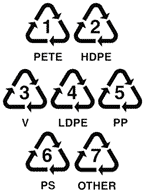
For polyethylene terephthalate, the letters "PETE" and the number 1.
For high density polyethylene, the letters "HDPE" and the number 2.
For vinyl, the letter "V" and the number 3.
For low density polyethylene, the letters "LDPE" and the number 4.
For polypropylene, the letters "PP" and the number 5.
For polystyrene, the letters "PS" and the number 6.
For any other, the letters "OTHER" and the number 7.At the Robeson County Solid Waste collection sites we accept 1 and 2 bottles in a container marked with a sign that states Plastic Bottles 1 & 2.
So what happens when you recycle plastic?
And what can a plastic bottle become? Click here to find out.
The collection sites do not accept or recycle plastic bags as they are banned from the processor or materials recovery facility. Please take plastic bags to your local grocery store for recycling opportunities.
Metals: Metal recycling is a very common practice. Residents can bring their metal products (copper, steel, aluminum, brass, iron and wires) to any of the collection sites or can take their metal products directly to the local recycler for Robeson County, Martin Metals located at 5044 west, US-74, Lumberton, NC 28360.
How is metal recycled? Click here to find out.
Electronic or E-Waste: Electronics recycling is relatively new to the recycling world. “N.C. General Statutes 130A-309.130 through 130A-309.141 "Discarded Computer Equipment and Television Management" establishes an electronics recycling program for the State of North Carolina with shared responsibility between computer manufacturers, television manufacturers, retailers, local and state government, and consumers with the general goal of fostering a statewide recycling infrastructure for these materials. In conjunction with this program, the law bans televisions, computers, monitors, printers, scanners, and computer peripherals such as keyboards and mice from disposal in landfills.” read more
Robeson County Solid Waste accepts these items at all of our collection sites and from there they are taken to a recycler that accepts these products. The product is either broken down for parts and sold into the market or refurbished by the recycler and sold intact to a different market. All E-Waste recyclers in North Carolina are required to register with the NC Department of Environmental Quality.
What do we accept?
- Computers Printers
- Televisions Scanners
- Monitors Computer accessories such as keyboards and mice
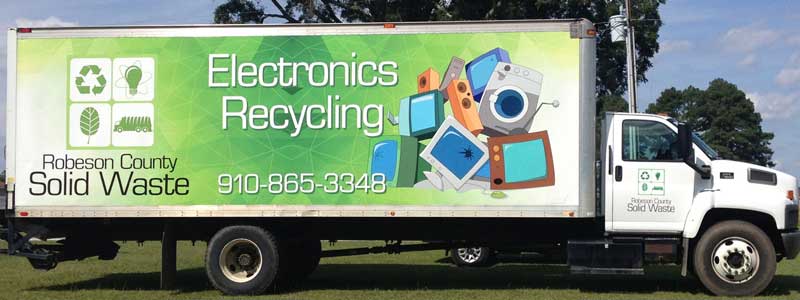
Bulbs and Batteries:
Light bulbs and Thermostats:
Fluorescent Light bulbs and thermostats that contain mercury are accepted at the collection sites these items are banned from the landfill and must be recycled. From the collection sites they are taken back to a centralized location for packaging and shipping for recycling.Batteries:
Did you know that lead acid batteries are not accepted at landfills in North Carolina?
“As of 1991 it became illegal in North Carolina to dispose of a lead-acid battery in a landfill, incinerator or any waste-to-energy facility. Retailers of lead-acid batteries are required by law to accept batteries for recycling if a battery is purchased. Retailers are also required to post a sign which states:- It is illegal to improperly dispose of a motor vehicle battery or other lead acid battery
- Recycle your used batteries
- State law requires us to accept used motor vehicle batteries or other lead acid batteries for recycling in exchange for new batteries purchased." read more
Our collection sites accept all batteries to ensure proper disposal and recycling. All batteries must be packaged for transportation in a manner which prevents short circuiting and damage to the battery or its terminals. This may be achieved by the following the preventive measures listed below: Each battery must be placed in a separate plastic “baggie” or the terminal ends must be taped securely. Alkaline batteries must be packaged separate and not mixed with any other chemical type of battery. Batteries must be properly labeled and separated by their chemical type (ni-cad, lithium, alkaline, lead, etc.).
Oil, Oil Filters and Anti-Freeze:
Oil, oil filters, anti-freeze are banned items from the landfill. Each collection site accepts these items to ensure proper disposal through recycling.White Goods:
White goods is a term used to describe large appliances such as refrigerators, ranges, water heaters, freezers, unit air conditioners, washers and dryers. These items are banned from the landfill and often contain refrigerants. All collection sites accept these items and recycle both the appliance and drain them of the refrigerant so it can be recycled as well.
Food and Beverage Cartons/Cardboard/Paper: At this time the only collection site that accepts cardboard and paper is the Wiregrass site (8072 Wire Grass Road Fairmont NC 28340). Cardboard boxes need to be flattened with no Styrofoam or plastic attached.
Cardboard/Paper:
At this time the only collection site that accepts cardboard and paper is the Sanchez site. However, cardboard (only) is accepted at the both Sanchez and Wiregrass road. Cardboard boxes need to be flattened with no Styrofoam or plastic attached.
What happens to paper and cardboard when it is recycled? Click here to find out.
Recycling Cartons 101:
https://www.recyclecartons.com/recycling-101Tires:
Car tires are banned from the landfill but accepted at each collection site (non-business only and no more than 4). Tires are brought to a centralized location and taken to a tire recycler. A tire can be recycled into many valuable items. The larger tires can be used for stone aggregates, or as fuel to power kilns, mills and power plants. Smaller tires are used on athletic fields, paving and landscaping applications such as mulch.
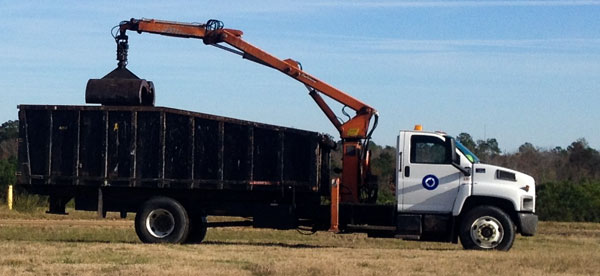
Clothing: Clothing is accepted at sites that contain “Swap Shops” located at Lowe Rd and Lamb Rd. Furniture is not allowed in the swap shops and all clothing must be on racks.
If you are a resident that lives within the city limits of a municipality, contact your service provider for more information on recycling opportunities.
- Computers Printers
-
Education and Outreach:
Robeson County Solid Waste offers presentations to Robeson County schools, businesses, not-for-profits, faith-based organizations, civic groups, governmental organizations, and the public. These presentations provide information on collection, separation of waste from recyclables, the recycling process, current efforts, market information, NC green efforts, litter abatement, conservation, civic involvement and resources.
Use this "Contact Form" to request a presentation.Resources:
http://www.re3.org/
http://www.recycleguys.org/
http://www.iwanttoberecycled.org/
http://www.eenorthcarolina.com/
http://www2.epa.gov/recycle/reduce-reuse-recycle-resources-students-and-educators
http://www2.epa.gov/new-bedford-harbor/environmental-education-resources-teachers-and-students
http://www2.epa.gov/students
http://www.earth911.com/ -
Abandoned Manufactured Homes:
Manufactured homes are a low-cost housing option for many people. Over the years however these homes fall into a state of disrepair, are abandoned, become dilapidated, burned and are uninhabited by the owner. For this reason, Robeson County has established the definition of an abandoned or dilapidated manufactured home and a program to aid in the removal of the program, enforced through Ordinance. Manufactured homes contain materials that are both banned from the landfills and are recyclable and are categorized under recycling.
An abandoned manufactured home (also referred to as an AMH) is a manufactured home that is not occupied as a dwelling and does not provide complete independent living facilities for one (1) family, including permanent provisions for living, sleeping, cooking, and sanitation; or a manufactured home or mobile home that is a health and safety hazard as a result of the attraction of insects or rodents, conditions creating a fire hazard, dangerous condition constituting a threat to children, or frequent use by vagrants as living quarters in absences of sanitary facilities; or an any structure which is a manufactured or mobile home that was designated and intended for residential use or other uses, which has been vacant or not in active use, regardless of purpose or reason, for a two (2) year period and has been deemed a nuisance to safety and general welfare.
Dilapidated Manufactured Home: A manufactured home that has fallen into a state of disrepair, as by misuse or neglect reduced to or fallen into partial ruin or decay, as from age, wear, or neglect such that it has become a health or safety hazard as stated in abandoned manufactured home.”
Abandoned and dilapidated manufactured homes are addressed in the Robeson County Solid Waste Ordinance and defined as demolition material. “Solid Waste resulting solely from construction, remodeling, repair, or demolition operations on buildings, or other structures, but does not include inert debris, land-clearing debris, yard debris, or used asphalt, asphalt mixed with dirt, sand, gravel, rock, concrete, or similar non-hazardous material. For the purpose of this Ordinance abandoned manufactured homes, mobile homes, burned or partially burned structures and other uninhabited structures which are declared unsafe or unfit for repair by the County Director of Inspection or his designate will be demolition waste.”
Once an abandoned manufactured home (AMH) has been identified the owner will be issued a Notice of Violation and given thirty (30) day to address the AMH. The violation can be remedied either through the removal of the AMH or making necessary repair. In the event the responsible party fails to address the issues stated in the Notice of Violation, they will be in violation of the Robeson County Solid Waste Ordinance which is a misdemeanor and subject to prosecution.
At this time, Robeson County Solid Waste has been awarded a grant from the NC Department of Environmental Quality to aid in the costs associated with the removal of AMH for those candidates that meet criteria. To find out if you qualify for this program or if you have received a violation notification in the mail please call our office if you have any questions or need additional information: 910-865-3348.
-
Energy:

Robeson County Solid Waste has a waste-to-energy program that harvests methane gas generated from the landfill and is processed to create energy which is sold back to the grid. Landfill gas is created during the anaerobic decomposition of organic substances in municipal solid waste. If landfill gas is allowed to escape to atmosphere, methane contained within it is a powerful greenhouse gas.
Robeson County Solid Waste now has 2, GE Jenbacher gas energy generators that are working around the clock to make the conversion of waste to energy. The first generator was installed in 2011 and became fully operable in 2012. The second generator became operable in 2015. Click here to learn more.How is waste converted to energy? Click here to find out.
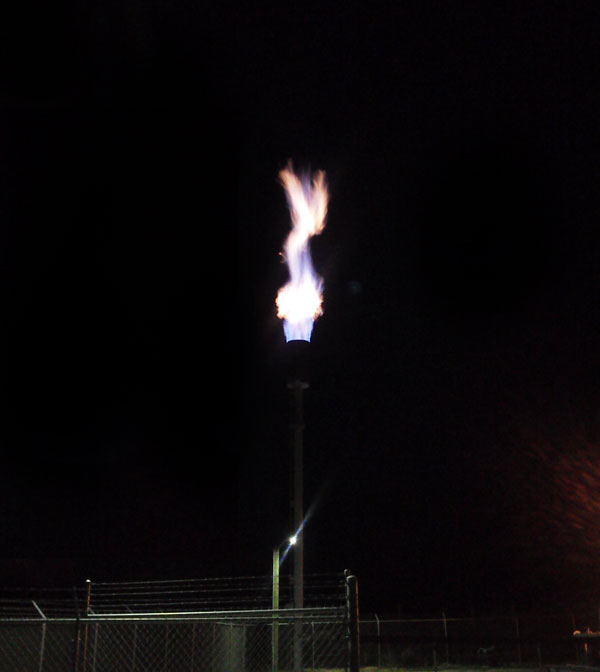
(generator flare)
-
Pesticide Container Recycling:
The Pesticide Container Program is offered at 7 of the 20 collection sites. This program is a collaborative agreement between Robeson County Solid Waste to complete the onsite inspections, North Carolina Cooperative Extension, Robeson County Center who provides the training to both the applicators and the inspectors and USAg as the recycler. The containers are granulated by USAg Recycling, Inc. and are used to make industrial type products, not consumer use products. USAg is contracted by The Ag Container Recycling Council (ACRC) is an industry funded not-for-profit organization that safely collects and recycles agricultural crop protection, animal health and specialty pest control product containers (Jugs and Drums). We have recently received grant funding from the NC Department of Agriculture and Consumer Services to purchase rinse nozzles and brochures to distribute to applicators to assist with program participation.
Click here to download Pesticide Trifold
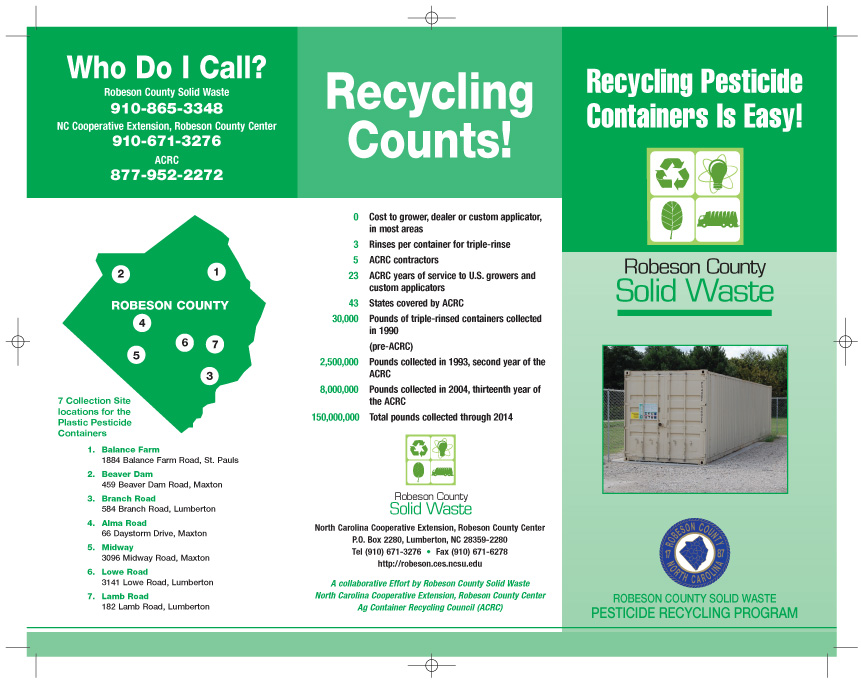
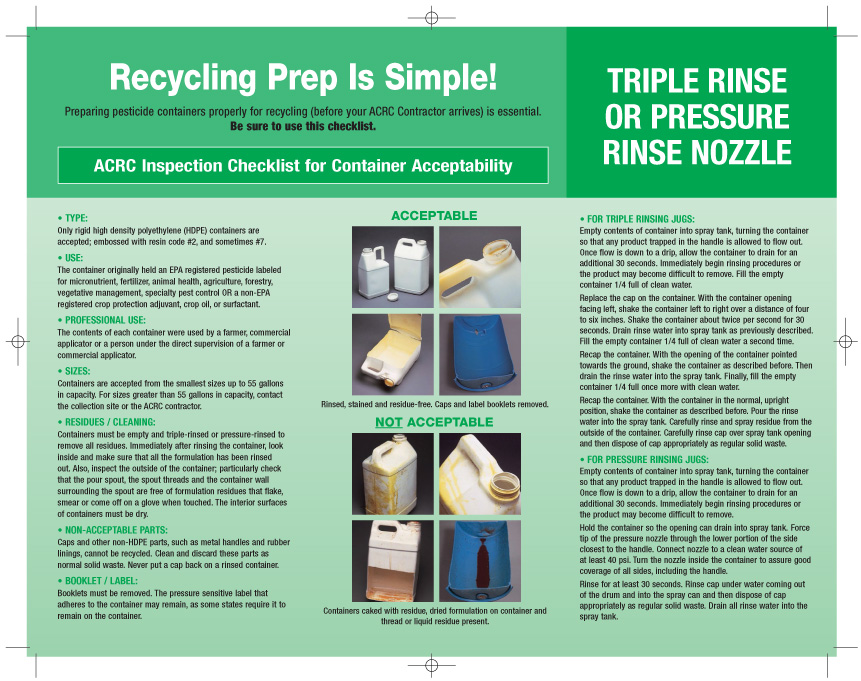
- 1







